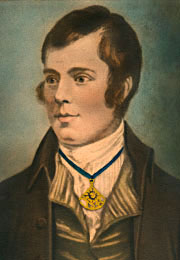
|
| 
| |
This poem was taken from a MS. in the poet’s handwriting in the possession of Mr. James Duncan, Mosesfield, near Glasgow, and first printed in Mr Robert Chambers’s edition of the poet’s works, 1838.†
|
HEARD ye o' the tree o' France, | |
I watna1. what’s the name o't. | |
Around it a' the patriots dance, | |
Weel Europe kens the fame o't. | |
It stands where ance the Bastile stood, | |
A prison built by kings, man, | |
When Superstition’s hellish brood | |
Kept France in leading-strings, man. | |
|
|
Upo' this tree there grows sic fruit, | |
Its virtues a' can tell, man; | |
It raises man aboon the brute, | |
It maks him ken himsel, man. | |
Gif ance the peasant taste a bit, | |
He’s greater than a lord, man, | |
And wi' the beggar shares a mite | |
Of a' he can afford, man. | |
|
|
This fruit is worth a' Afric’s wealth, | |
To comfort us 'twas sent, man: | |
To gie the sweetest blush o' health, | |
And mak us a' content, man | |
It clears the een, it cheers the heart, | |
Maks high and low gude friends, man; | |
And he wha acts the traitor’s part, | |
It to perdition sends, man. | |
|
|
My blessings aye attend the chiel2. | |
Wha pitied Gallia’s slaves, man, | |
And staw3. a branch, spite o' the deil, | |
Frae yont4. the western waves, man. | |
Fair Virtue watered it wi' care, | |
And now she sees wi' pride, man, | |
How weel it buds and blossoms there, | |
Its branches spreading wide, man. | |
|
|
But vicious folk aye hate to see | |
The works o' Virtue thrive, man; | |
The courtly vermin’s banned the tree, | |
And grat5. to see it thrive, man; | |
King Louis thought to cut it down, | |
When it was unco6. sma', man | |
For this the watchman crack'd his crown, | |
Cut aff his head and a', man. | |
|
|
A wicked crew syne,7. on a time, | |
Did tak a solemn aith, man, | |
It ne'er should flourish to its prime, | |
I wat8. they pledged their faith, man. | |
Awa they gaed9. wi' mock parade | |
Like beagles hunting game, man, | |
But soon grew weary o' the trade, | |
And wish'd they'd been at hame, man. | |
|
|
For Freedom, standing by the tree, | |
Her sons did loudly ca', man; | |
She sang a sang o' liberty, | |
Which pleased them ane and a', man | |
By her inspired, the new-born race | |
Soon drew the avenging steel, man; | |
The hirelings ran--her foes gied10. chase, | |
And bang'd11. the despot weel, man | |
|
|
Let Britain boast her hardy oak, | |
Her poplar and her pine, man, | |
Auld Britain ance could crack her joke, | |
And o'er her neighbours shine, man | |
But seek the forest round and round, | |
And soon 'twill be agreed, man, | |
That sic a tree can not be found | |
'Twixt London and the Tweed, man. | |
|
|
Without this tree, alake this life | |
Is but a vale o' woe, man; | |
A scene o' sorrow mix'd wi' strife, | |
Nae real joys we know, man. | |
We labour soon, we labour late, | |
To feed the titled knave, man; | |
And a' the comfort we're to get, | |
Is that ayont the grave, man. | |
|
|
Wi' plenty o' sic trees, I trow, | |
The warld would live in peace, man; | |
The sword would help to mak a plough, | |
The din o' war wad cease, man. | |
Like brethren in a common cause, | |
We'd on each other smile, man; | |
And equal rights and equal laws | |
Wad gladden every isle, man. | |
|
|
Wae worth the loon wha wadna eat | |
Sic halesome dainty cheer, man; | |
I'd gie my shoon frae aff my feet, | |
To taste sic fruit, I swear, man. | |
Syne let us pray, auld England may | |
Sure plant this far-famed tree, man; | |
And blithe we'll sing, and hail the day | |
That gave us liberty, man.
|
|
Transcribed from The Complete Works of Robert Burns. William P. Nimmo, Edinburgh: 1867. p. 79.
† "This poem was from a MS. in the Poet’s handwriting in the possession of the late Mr James Duncan, Mosesfield, near Glasgow, and was first printed in Mr Robert Chambers’s edition of the Poetical Works of Robert Burns, 1838." The Works of Robert Burns; with Notes and Illustrations,John Wilson (1785-1854). Glasgow : Blackie and Son, 1859. p. 129.
Cf.: "The Tree of Liberty reads like a bad blend of Scots Wha Hae and Is There For Honest Poverty; and as the MS. has not been heard of since 1838, we may charitably conclude that Burns neither made the trash nor copied it." The Complete Poetical Works of Burns, William Ernest Henley and Thomas F. Henderson. Boston : Houghton Mifflin Company, 1897. p. 320.
|
|